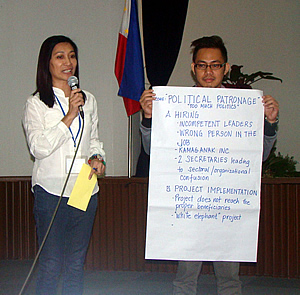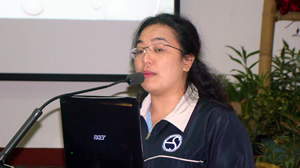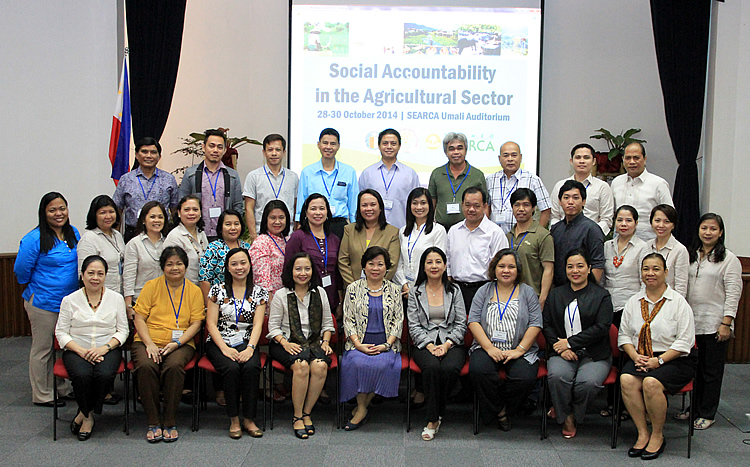 The course was a collaboration between SEARCA and the Ateneo School of Government (ASoG). Held on 28-30 October 2014, it was the last of the activities under the five-year Umbrella Capacity Development Program for the Department of Agriculture (DA) executives and professional staff being implemented by SEARCA with the Ateneo School of Government (ASoG), the University of Asia and the Pacific School of Management (UA&P SMN), and the UPecon Foundation, Inc. In general, the course aimed to contribute to the development of a cadre of leaders in the agriculture sector who have a command of the political and ethical elements of governance towards the achievement of excellence in public service.
The course was a collaboration between SEARCA and the Ateneo School of Government (ASoG). Held on 28-30 October 2014, it was the last of the activities under the five-year Umbrella Capacity Development Program for the Department of Agriculture (DA) executives and professional staff being implemented by SEARCA with the Ateneo School of Government (ASoG), the University of Asia and the Pacific School of Management (UA&P SMN), and the UPecon Foundation, Inc. In general, the course aimed to contribute to the development of a cadre of leaders in the agriculture sector who have a command of the political and ethical elements of governance towards the achievement of excellence in public service.
Specifically, the course aimed to strengthen the managerial and leadership practices in the DA to better deal with issues of corruption and social accountability. It introduced the participants to the complexity and dynamism of social accountability as an approach to good governance, particularly to the agriculture sector that has been riddled with many challenges of transparency and accountability. The course invited the participants to examine contextual factors that appear to be critical in shaping social accountability interactions, and offered a flexible but analytical framework to guide the participants in strengthening social accountability measures and practice for the DA.
Resource persons of the course tackled the following topics:
- Introduction to Good Governance, which provided an overview of accountability, with governance as a democratic ideal;
- Social Accountability Stakeholders, which presented the dynamics between the government and civil society as the two key actors in social accountability;
- Social Accountability Concepts and Practices, which provided a number of tools that would help in understanding social accountability, and described the enabling conditions of social accountability (also called the four pillars of social accountability);
- Social Accountability and Public Finance Management (PFM), which discussed social accountability as an approach to practice good governance in the context of PFM where good governance decisions are undertaken to improve service delivery, protect rights and promote community welfare;
- Participatory Planning, which aimed for the participants to understand participatory planning and its principles as an approach in strengthening social accountability;
- Participatory Budgeting, which discussed budget analysis practices and tools, its importance in social accountability, limitations, and challenges;
- Local Budgeting and Expenditure Tracking, which situated the social accountability framework in DA’s existing experience, practices, and projects;
- Participatory Expenditure Tracking, which facilitated familiarity with various ways in which the participatory expenditure tracking surveys can be used to assess delivery of public services and mainstreamed social accountability measures in the procurement process of the DA;
- Social Accountability Practice: Issues, Challenges, and Innovations, which taught participants how to localize social accountability in a decentralized system, and assessed and discussed the prevailing challenges in social accountability as it is practiced in the DA; and
- Designing Social Accountability Interventions for the DA, where participants identified key parameters and guidelines for customizing, developing, and refining a social accountability tool and in adapting it to the DA.
Participants were also taught the process for designing a social accountability program and integrating social accountability in existing programs in the DA.
 These sessions were delivered through lectures and discussions, case studies, and workshops. The training course involved a highly interactive process between the participants and the resource persons in maximizing learning and development. Learning interactions allowed the participants to explore social accountability practices and concepts to deepen the values they want to uphold as citizens in general and as public servants in particular.
These sessions were delivered through lectures and discussions, case studies, and workshops. The training course involved a highly interactive process between the participants and the resource persons in maximizing learning and development. Learning interactions allowed the participants to explore social accountability practices and concepts to deepen the values they want to uphold as citizens in general and as public servants in particular.
During the closing program of the course on 30 October, Atty. Jennilyn M. Dawayan, Assistant Regional Director for Research and Regulatory of the DA Regional Office III in Pampanga, noted that the course helped raise the awareness of and challenged the participants to act in ways that promote a more just and accountable governance. Atty. Dawayan served as one of two representatives of the participants in giving their insights about the course.
The ASoG team was led by Ms. Aurma M. Manlangit, Director of the JVO Executive Education Program. (Nova A. Ramos)
